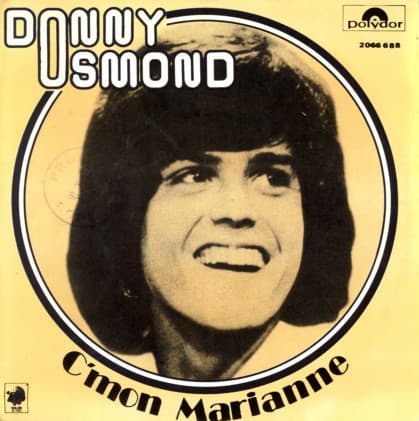
🎶 The Purple Heartbreak: Reclaiming Love in the Face of Rumor
The poignant plea for reconciliation after a passing fling threatened a cherished relationship.
For those of us who came of age during the Technicolor explosion of the 1970s, the name Donny Osmond conjures a flood of memories: wholesome Saturday mornings, the dazzling variety of the Donny & Marie show, and, of course, a string of pure, earnest pop hits. By the mid-seventies, however, the teen idol was transitioning, attempting to shed the mantle of “Puppy Love” for a more mature, and perhaps a little funkier, sound. This ambition coalesced into the 1976 album, Disco Train, which, as its title suggests, was an effort to catch the era’s irresistible beat.
The lead single from this ambitious, if slightly bewildering, sonic detour was a cover of the Four Seasons’ 1967 hit, “C’mon Marianne”. Released on June 5, 1976, this single stands as one of the final solo chart entries from Donny Osmond before his remarkable late-80s career resurgence. In the United States, it peaked at a modest, but respectable, Number 38 on the Billboard Hot 100 chart. It fared better on the Adult Contemporary landscape, reaching Number 25 on the Easy Listening Chart—a clear sign that, despite the disco aspirations of the Disco Train album (which itself only reached No. 145 on the Billboard 200), Donny’s loyal audience still craved the heart and soul he brought to a melody. In an interesting note on its international reception, the single was a slightly bigger success in the UK, reaching Number 18 on the Official Singles Chart.
The original Four Seasons version of “C’mon Marianne” was a breezy, upbeat plea. Donny Osmond‘s rendition, produced by the well-connected Mike Curb, retains a buoyant energy but infuses the track with a contemporary 1970s pop-soul arrangement, complete with the signature backing vocals that characterized his sound. This single represents a pivotal moment in his career; it was his last solo Top 40 hit in the U.S. until the surprising success of “Soldier of Love” thirteen years later, marking the end of the initial, white-hot phase of his teen idol dominance.
The core meaning of the song, penned by L. Russell Brown and Raymond Bloodworth, is a timeless tale of a lover’s desperate attempt to reconcile after a devastating—and allegedly minor—infidelity. The lyrics are straightforward, heartfelt, and utterly relatable: a man on his knees, begging his partner, Marianne, to see reason. He cries out, “Oh here I am (here I am) / On my knees again (knees again) / I’ll do anything (anything) / Just to make it right.” The key to the betrayal, and his defense, lies in the iconic lines: “Don’t matter what the people say (people say) / It didn’t happen that way (happen that way) / She was a passing fling (passing fling) / Not a permanent thing (permanent thing).”
For the audience of the mid-seventies—many of whom had grown up alongside Donny as they navigated the awkward realities of young adulthood, marriage, and first stumbles—this song struck a chord. It wasn’t about the giddy, innocent “Puppy Love” anymore; this was about grown-up mistakes and the messy, beautiful work of reclaiming a real, cherished relationship. Donny Osmond’s earnest vocal delivery, still carrying that familiar, sincere ring, transformed what could have been a shallow cover into a profound act of vulnerability. It gave voice to the fear of losing everything over a fleeting error, making his version, for many, the definitive soundtrack to a moment of deeply felt regret and longing for forgiveness. Looking back, we can hear in this track not just a transition in sound, but a young man facing the complexities of an adult life under a microscope, trying to move beyond the simplistic labels assigned to him and make music that truly resonated with the emotional tapestry of his time. It’s a sweet, nostalgic reminder of an era when a pleading pop song could still stop the world for three minutes.